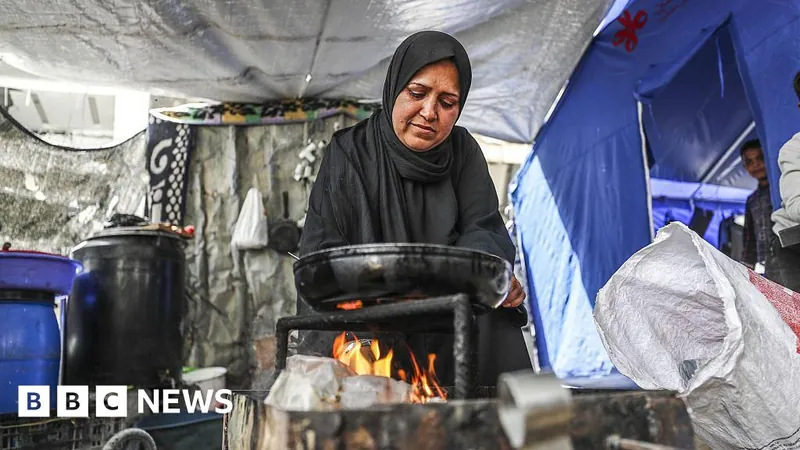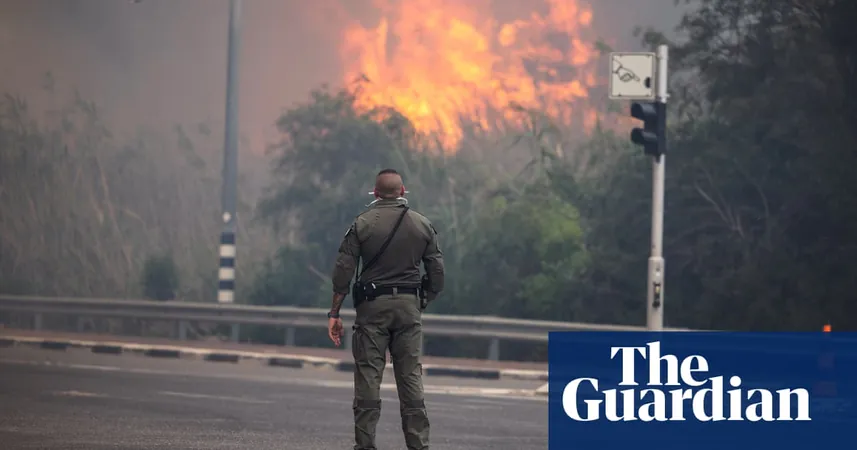
Gaza Declared a ‘Killing Field’ by UN Chief Amid Urgent Call for Humanitarian Aid
2025-04-08
Author: Ming
Gaza Declared a ‘Killing Field’ by UN Chief Amid Urgent Call for Humanitarian Aid
In a stark warning, UN Secretary-General António Guterres has described the Gaza Strip as a "killing field," emphasizing the critical humanitarian crisis that has emerged following Israel's re-intensified blockade and military actions against Hamas. Guterres lamented that "aid has dried up [and] the floodgates of horror have re-opened," highlighting the desperation faced by civilians in the region.
His comments came in conjunction with a joint statement by the heads of six UN agencies, which stressed the urgent need for world leaders to take immediate action to facilitate the flow of food and medical supplies into Gaza. The situation has deteriorated sharply since Israel re-established its blockade on March 2, following a failure to extend a ceasefire due to ongoing hostilities.
As the Israeli military resumed its aerial bombardments and ground offensives from March 18, new reports have indicated that at least 1,449 Palestinians have lost their lives, according to the Hamas-run health ministry. The Israeli military, however, denies intentionally targeting civilians and asserts that their operations focus solely on Hamas militants.
Guterres emphasized the responsibilities of Israel as the occupying power under international law, stating, "The current path is a dead end – totally intolerable in the eyes of international law and history." In response, Israel's foreign ministry dismissed Guterres's accusations, claiming that there is adequate food supply within Gaza and accusing him of spreading misinformation.
Israeli spokesman Oren Marmorstein asserted, "There is no shortage of humanitarian aid in the Gaza Strip - over 25,000 aid trucks have entered the Gaza Strip in the 42 days of the truce." However, the UN agencies involved insist that the reality on the ground presents a different picture.
In their statement, the six UN agencies emphasized that Gazans are "trapped, bombed and starved again." They criticized the assertion that food is sufficient, stating that essential supplies are dwindling, with all UN-supported bakeries forced to close, markets stripped of fresh produce, and hospitals now rationing vital medications.
The statement was endorsed by key United Nations organizations, including the UN's Office for the Coordination of Humanitarian Affairs (OCHA), UNICEF, the World Food Programme (WFP), the World Health Organization (WHO), UNRWA (the UN agency for Palestinian refugees), and UNOPS (the UN Office for Project Services).
As the two-month ceasefire brought a temporary influx of humanitarian aid and the release of 33 hostages by Hamas—eight of whom were reported dead—calls for an enduring solution intensify. The UN agencies have urged world leaders to “act – firmly, urgently and decisively” to uphold the fundamental principles of international humanitarian law, including the protection of civilians, facilitation of aid, and renewal of ceasefire agreements.
With calls for international intervention growing, the dire situation in Gaza continues to evolve, leaving countless civilians impacted in what many view as a humanitarian catastrophe. The world watches closely as the actions of international leaders may prove critical in determining Gaza’s future.

 Brasil (PT)
Brasil (PT)
 Canada (EN)
Canada (EN)
 Chile (ES)
Chile (ES)
 Česko (CS)
Česko (CS)
 대한민국 (KO)
대한민국 (KO)
 España (ES)
España (ES)
 France (FR)
France (FR)
 Hong Kong (EN)
Hong Kong (EN)
 Italia (IT)
Italia (IT)
 日本 (JA)
日本 (JA)
 Magyarország (HU)
Magyarország (HU)
 Norge (NO)
Norge (NO)
 Polska (PL)
Polska (PL)
 Schweiz (DE)
Schweiz (DE)
 Singapore (EN)
Singapore (EN)
 Sverige (SV)
Sverige (SV)
 Suomi (FI)
Suomi (FI)
 Türkiye (TR)
Türkiye (TR)
 الإمارات العربية المتحدة (AR)
الإمارات العربية المتحدة (AR)